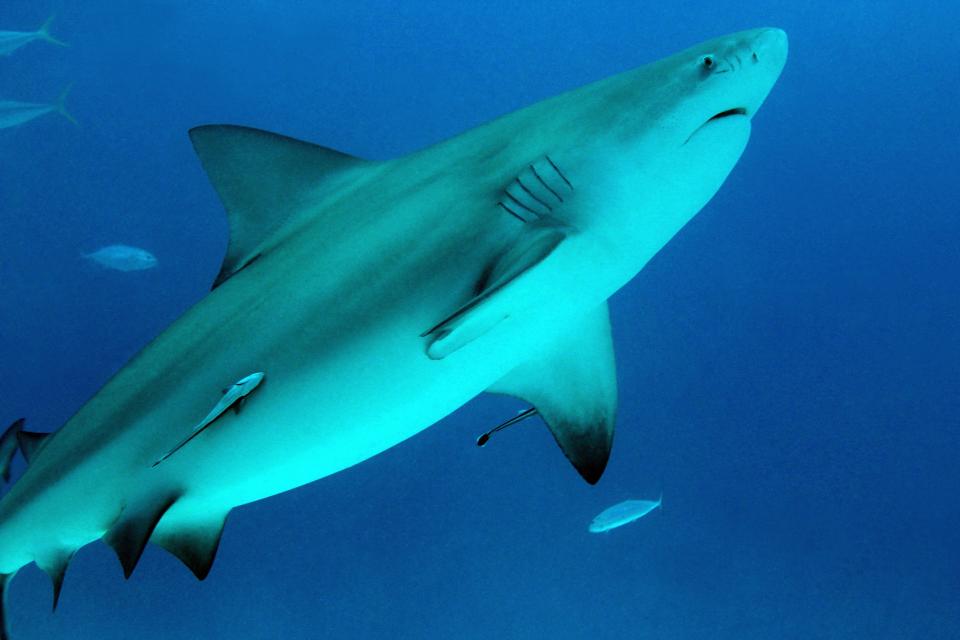Shark Week: Jersey Shore men may have found first recorded shark attack in North America
On a stifling hot Wednesday afternoon, Aug. 15, 1640, a young indentured servant went for a swim in the St. Mary's River in Maryland, when he was suddenly seized by a "huge fish."
Whatever attacked the young man, whose name remains unknown, it tore off a large portion of his thigh in an effective and lacerating fashion, and he left the world of the living shortly thereafter. Furthermore, the priest who told of the story thought the man had it coming.
If the story is true, it could be the first recorded account of an unprovoked, fatal shark attack on a person swimming leisurely in North America. Two Jersey Shore men are the making the case that it is.
It would predate Washington Irving's account of a 1642 fatal "fish" attack on Antony Van Corlaer on the Harlem River, though whether that story is accurate or simply a parody is debatable. However, Allenhurst author Richard Fernicola believes there is no mistaking the St. Mary's River fatality.

When is Shark Week? Here are the 2023 dates for shows on the Discovery Channel
"I don't think anyone is going to dispute that this was a shark attack and quite possibly the first on a recreational swimmer in North America and maybe all of the Americas," Fernicola said.
The account came from a Jesuit priest Thomas Copley who described the fatal incident in the Annual Letters of the Provincials of the Society of Jesus to the General of the Society at Rome. It was written in Latin and simply became buried in the archives for years until it was translated to English in 1832 and re-published again in 1874 in the "Narratives of Maryland: 1633-1684."
There it went unnoticed until biologist Kent Mountford, doing research for the Environmental Protection Agency's Chesapeake Bay Program, found it and mentioned it briefly in a larger Bay Journal article about Maryland's colonial history that was published in 2010. Mountford, though, was not looking for shark attacks and didn't immediately realize the hidden gem he had unearthed.
Shore surfer OK after shark bite: Here is how to lower your risk with sharks
'It just stunned me'
Seven years later, Fernicola, author of "12 Days of Terror" an account of the 1916 shark attacks at the Jersey Shore, was doing research on the Jesuits in Maryland and stumbled upon Mountford's article. Fernicola is a graduate of Georgetown University, which was founded by Jesuits.
"I'm doing independent research and I'm reading this and it just stunned me. I see this account about a potential shark attack and I just had to email Mountford," said Fernicola.
Fernicola and Mountford, who splits his time between his beach house in Manasquan and Lubsy, Maryland, then began to scour the historical records to provide background and to prove that Copley's account is an authentic shark attack.
The 1916 shark attacks: The day the terror began
"We been studying the last two centuries of sharks and people on the Chesapeake Bay and we've come up with a 150 or more events where people caught sharks, saw sharks, were chased by sharks and several cases where people were bitten by sharks, lost a leg, got hospital care and in some cases, died," Mountford said.
'Divine justice'
Copley's account, however, was the first, he said. The Annual Letters of the Jesuit priests were intended to capture missionary accomplishments of the previous year, so the letters were mainly dedicated to ministerial themes, referring to riverside missions of Maryland's colonial period. The "huge fish," though, must have left a big impression on him, as he found it worth mentioning, albeit in a short passage, Fernicola said.
The priest described the event as "divine justice," because he decried the young man as a sinner for having eaten his rosary beads, which were made of dried fruits, nuts, seeds and bone.
Copley wrote: "in the afternoon, when he (the victim) had betaken himself to the river for the purpose of swimming, scarcely had he touched the water when a huge fish suddenly seized the wicked man, before he could retreat to the bank, (and) tore away, at a bite, a large portion of his thigh, by the pain of which most merited laceration … the unhappy wretch was in a short time hurried away from the living."
Fernicola said the account most likely described a man going into hypovolemic shock and dying from blood loss. At the time, the word "shark" was seldom used. Most accounts refer to them as big fish.
Fernicola and Mountford believed the likely culprit was a bull shark because of its predatory, aggressive nature and that fact that it can survive in brackish water. That species of shark is also believed by many to be the one responsible for the Matawan Creek fatal shark attacks in the summer of 1916, although there is no conclusive evidence.

Chomp! Great white shark surprises fishermen off Point Pleasant Beach, tries to eat catch
While the 1640 incident is by no means the first shark attack on humans in North America, earlier accounts are of pearl divers or sailors who have fallen overboard. Fernicola surmises there probably were incidences of Native American leisurely swimmers being attacked, but they lack written records. What the 1640 account represents, according to Fernicola and Mountford, is the first written record in North America of a recreational swimmer being fatally attacked by a shark.
Their goal now is to publish their findings and to get the attack listed in the Princeton-based Shark Research Institute's Global Shark Attack File and the Florida Museum of Natural History's International Shark Attack File.
Marie Levine, the executive director of the Shark Research Institute, believes the account to be consistent with a shark attack. Fernicola submitted the research to the Florida Museum on July 19.
135-year-old mystery solved? We may finally know Asbury Park's East Coast surfing pioneer
When Jersey Shore native Dan Radel is not reporting the news, you can find him in a college classroom where he is a history professor. Reach him @danielradelapp; 732-643-4072; dradel@gannettnj.com.
This article originally appeared on Asbury Park Press: Shark Week: First recorded attack in America may have been found

